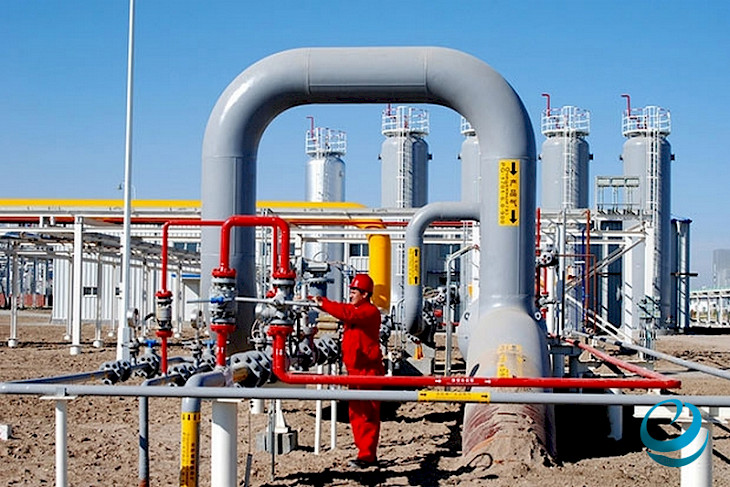Uzbekistan has reached an agreement to purchase more natural gas from Turkmenistan, although specific volumes and prices have not yet been determined, The Caspian Post reports.
Uzbek President Shavkat Mirziyoyev discussed the deal during a phone conversation with Gurbanguly Berdimuhamedov, the Chairman of Turkmenistan's Halk Maslahaty (People's Council) and leader of the country.
According to Turkmen state news, Berdimuhamedov “agreed to increase” the supply of Turkmen gas to Uzbekistan. It wouldn't be surprising if Berdimuhamedov discreetly danced in celebration on the other end of the line.
Eager to Sell
Turkmenistan ranks fourth in the world for gas reserves, estimated at around 17.5 trillion cubic meters. To put this into perspective, the 27 countries of the European Union collectively consumed 350 billion cubic meters of gas in 2022, meaning Turkmenistan has enough gas to meet the EU’s current needs for 50 years.
Unfortunately, more than 33 years after independence, Turkmenistan still has relatively few buyers for its gas.
China purchases the bulk of Turkmenistan's gas, about 35 billion cubic meters (bcm) annually, followed by Uzbekistan, which has been buying 1.5–2 bcm per year in recent years, and Azerbaijan, which receives 1–1.5 bcm via a swap agreement with Iran.
Turkmenistan’s only recent successful export deal was with Iraq, involving 10 bcm of gas under a swap agreement with Iran. This deal requires maintenance and repair work on pipelines in Turkmenistan and Iran.
Turkmenistan recently lost Russia as a customer after their contract for up to 5.5 bcm of gas annually expired in late June 2024. The expiration of this agreement meant Turkmenistan lost its second-largest buyer, but this development might turn out to be advantageous for Uzbekistan.
Eager to Buy
Uzbekistan's rapid population growth and corresponding expansion of infrastructure have been accompanied by its inability to increase domestic gas production, turning the country into a net gas importer.
In late January 2023, Uzbek media reported that the country produced approximately 51.7 bcm of gas in 2022 and aimed to increase this to 56.3 bcm in 2023. Instead, gas production fell to 46.7 bcm in 2023 and is expected to decline further in 2024.
Uzbekistan signed its first gas supply contract with Turkmenistan in December 2022, with volumes of 1.5 bcm per year. By August 2023, the two countries had agreed to increase this to 2 bcm per year.
However, even this was insufficient to meet Uzbekistan's growing gas needs.
In June 2023, Uzbekistan signed a two-year agreement to import up to 2.8 bcm of gas from Russia. By March 2024, Uzbekistan reportedly planned to increase Russian gas imports to 11 bcm annually, starting in 2026.
It appears that part of the 5.5 bcm of gas Turkmenistan previously sold to Russia will now be redirected to Uzbekistan. For Turkmenistan, the gas deal with Uzbekistan compensates for only part of the revenue lost with the expiration of its contract with Russia.
Russia did not need the gas it imported from Turkmenistan and likely resold it to Uzbekistan starting in 2023, while technical work was being done to reverse the flow of pipelines previously used to transport Central Asian gas, including Uzbek gas. Now that the reversal is complete or nearly so, parts of this pipeline network will deliver Russian gas to Uzbekistan.
However, Turkmen gas must be cheaper than Russian gas for Uzbekistan. Reports suggest Turkmenistan sold gas to Russia for $110 per 1,000 cubic meters, while Uzbekistan buys Russian gas at $160 per 1,000 cubic meters.
From Gas to Liquids
The price of gas has not been disclosed in the reports, but Uzbekistan is likely to secure a reasonable deal, as another major topic of discussion between Mirziyoyev and Berdimuhamedov was water.
Most of Turkmenistan's water sources either pass by Uzbekistan or flow through its territory before reaching Turkmenistan.
Central Asia is already grappling with the effects of climate change: reduced rainfall, record-high summer temperatures, and accompanying droughts. Worsening the situation, the Taliban has begun constructing a canal that will divert a significant volume of water from the Amu Darya, one of Central Asia's major rivers.
Uzbekistan and Turkmenistan have for decades drawn water from the Amu Darya for their canal systems to irrigate agricultural lands. Now Afghanistan plans to do the same, utilizing its share of the Amu Darya water, which had not been previously claimed due to the prolonged conflict in the region.
Turkmenistan, as a downstream country and the final user of water from transboundary rivers, will increasingly depend on neighboring Uzbekistan's goodwill to ensure sufficient water supply for its needs.
The Beginning of Something Bigger?
The Turkmen-Uzbek gas agreement benefits both countries and may offer Uzbekistan the best solution to its growing energy needs.
Turkmenistan has few friends and gas customers, while Uzbekistan is both. This establishes a solid foundation for further increasing Turkmen gas exports to Uzbekistan in the future.
CentralasianLIGHT.org
December 11, 2024

